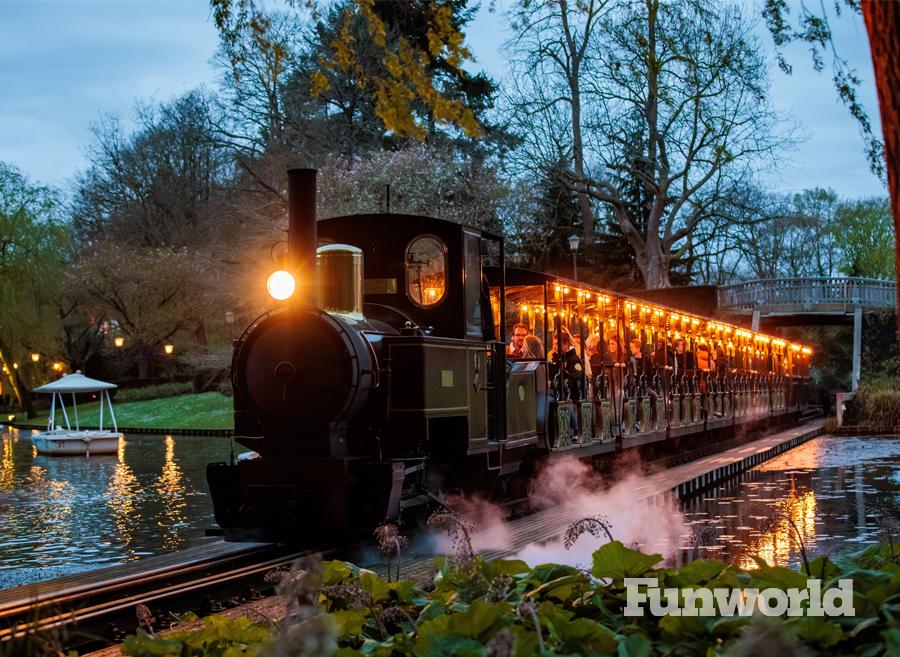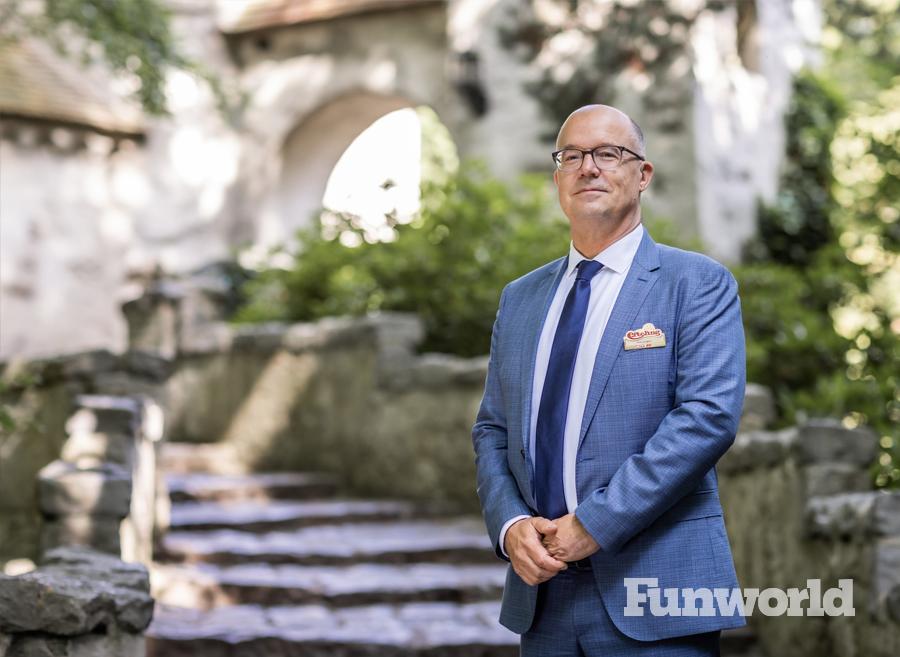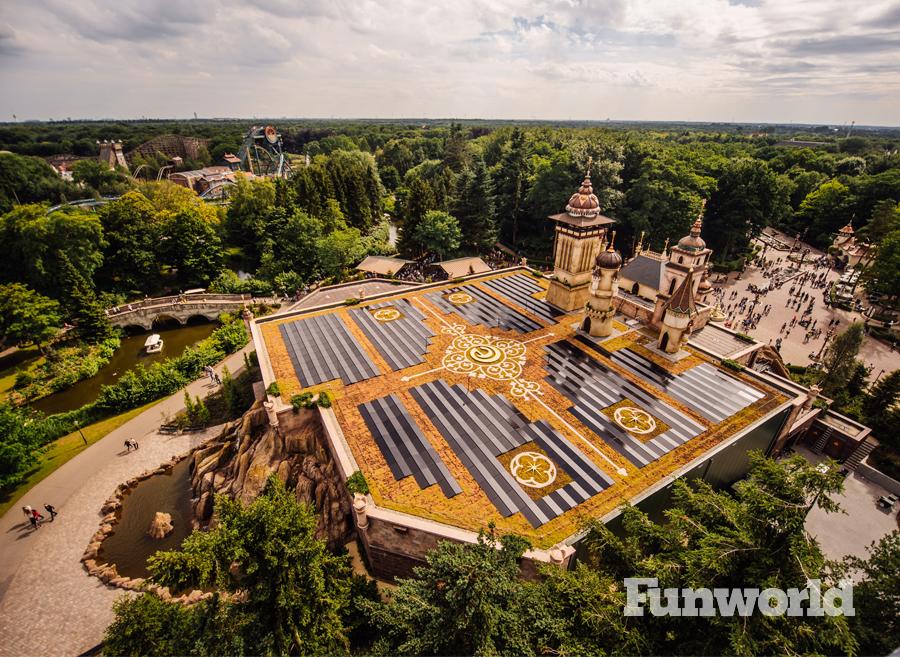Imagine a steam train that doesn’t depend on a roaring coal fire to generate the steam driving its wheels. Efteling, the enchanting theme park resort in the Netherlands, is turning that idea into a reality by converting its popular steam trains to run on battery-electric technologies.
Efteling aims to be climate-neutral by 2030 and climate-positive by 2032, therefore transitioning the railroad to a more sustainable power source.
“Since the arrival of our first steam locomotive, Aagje, 55 years ago, our trains have been running on coal. To achieve the ambitious goals we have set for ourselves, we must ensure the trains that transport passengers around the Efteling theme park will be electrically powered,” says Efteling CEO Fons Jurgens.
Efteling will gradually electrify its three current steam locomotives: Aagje (built in 1911), Moortje (1907), and Trijntje (1991). The trains will look the same, only the propulsion will change. The modified stock will feature steam train sound effects to evoke the experience of a classic ride.
Alan Keef Ltd, which originally supplied Trijntje, is working on Aagje first. The family-owned business—an authority on narrow gauge railways—is based in Herefordshire, United Kingdom. Efteling is committed to preserving its heritage, so it plans to store the parts removed from the steam trains in the Efteling Archive.
Guests will see the first electrically powered steam trains in operation during the upcoming holiday event, Winter Efteling. “It is a small step in the grand scheme of activities, but it will be very visible to our guests who love the nostalgic train trips through the park,” Jurgens says.
Sustainable Energy Sources
This project is part of Efteling’s broader drive toward sustainability. According to Jurgens, “accessibility, sustainability, and health” are logical starting points in all updated business plans.
For example, the darkly thrilling Danse Macabre ride, slated to open at Efteling on Oct. 31, and the new Efteling Grand Hotel will not use any fossil fuels. “On the hotel roof, we will install 120 extra solar panels,” Jurgens adds.
The park will connect the Efteling Grand Hotel and Danse Macabre to Efteling’s sustainable energy system, named Anderrijk. This system allows Efteling to heat and cool buildings in the Anderrijk area of the park using heat-cold storage instead of natural gas. The system also serves facilities that include the Efteling Theatre, the Fata Morgana ride, the Fabula 4D theater attraction, and the Frau Boltes Küche restaurant.
Sustainable energy storage will provide heat for the colder months. The heat that Danse Macabre produces during its operation, for example, will warm the attraction in winter. The park’s Aquanura water show is also connected to Anderrijk—“an innovative scientific project in the field of aquathermy,” Jurgens says.
Efteling has also switched to gas-free cooking in its restaurants, including Station de Oost and the Bäckerei Krümel bakery.
Efteling’s sustainable energy system has cut current gas consumption by 350,000 cubic meters annually. The park also expects to see reduced nitrogen deposition.
Just like households, Efteling’s electricity consumption peaks in the evening. The park cannot always meet this demand with the energy it generates from solar panels, especially in autumn and winter. So, in spring 2024, Efteling invested €3 million in batteries for energy storage and energy management. “The theme park will become more self-sufficient and less dependent thanks to the new batteries,” Jurgens says.
The batteries make it easier to maintain stability between supply and demand. The Efteling Smartgrid regulates and automates energy flows to ensure the most efficient use.
“By saving energy, generating energy (Efteling’s solar panel count hit more than 25,500 in September 2023), and reducing gas consumption, we are laying a solid foundation for our sustainability goals,” Jurgens says.
The park is taking a step-by-step approach that makes sense for their business plan.
“Our challenge is in the subjects where we do not have complete control over everything, such as waste and transport,” he says. “Ultimately, we want to eliminate residual waste, but visitors also like to bring their own food and drinks, and that can cause additional waste streams. We think carefully about how best to deal with this.”
Greener Travel
Visitor travel is another focus. “Mobility is a big challenge for our industry,” Jurgens says. The park aims to reduce CO2 emissions by encouraging people to use sustainable travel options rather than arriving by car. Efteling has struck agreements with rail and bus providers (including Arriva and Flixbus) to make it easy for potential guests to reach the theme park resort on public transport from anywhere in the Netherlands and Belgium.
Electric car charging stations are also available. “In 2021, we became the largest charging station in the Benelux with 87 charging points for 174 cars,” Jurgens says.
In addition, the park provides free bicycle parking. Efteling wants to cut CO2 emissions by 20% per employee. To motivate employees to cycle to work, the park offers interest-free loans when purchasing electric bicycles.
“We are adding more electric cars and devices to our fleet for use in park operations, such as electric trucks and lease cars. We also use electric leaf blowers and an electric outboard motor for the motorboat at our Gondoletta boat ride,” Jurgens explains.
Empowering All Stakeholders
He believes all staff must be involved in Efteling’s sustainability journey. “We run internal sustainability campaigns to create and refresh awareness. We believe everyone can contribute to their own work. Every little bit helps.” Efteling also engages with suppliers on sustainability. “We think it is important for the whole chain to become more sustainable. It’s a long haul, but we will persevere for a sustainable future.”
The park encourages visitors to do their part. Efteling’s chatty paper gobbler, named Holle Bolle Gijs, has long invited visitors to feed him paper scraps, making recycling fun. The park helps to support the charitable organization Villa Pardoes by collecting cans and PET bottles. Efteling shares its sustainability efforts with the public through its website, social media channels, and engagement with the media and international forums.
Efteling sees the well-being of its community and environment as integral to the business. “The largest part of our profit is reinvested in the company to ensure Efteling remains independent and charts its own course,” Jurgens says. “We are committed to passing on Efteling in an even more beautiful state than it already is.”
Juliana Gilling began covering the global attractions industry in 1994. She reports on innovative people, projects, and additions for Funworld and the IAAPA News Hub. Juliana lives in Whales, where she runs a freelance writing business. LinkedIn.
- This original reporting from IAAPA News first appeared in Funworld magazine. For more stories and videos covering the global attractions industry and to read a digital version of Funworld magazine, click here.




